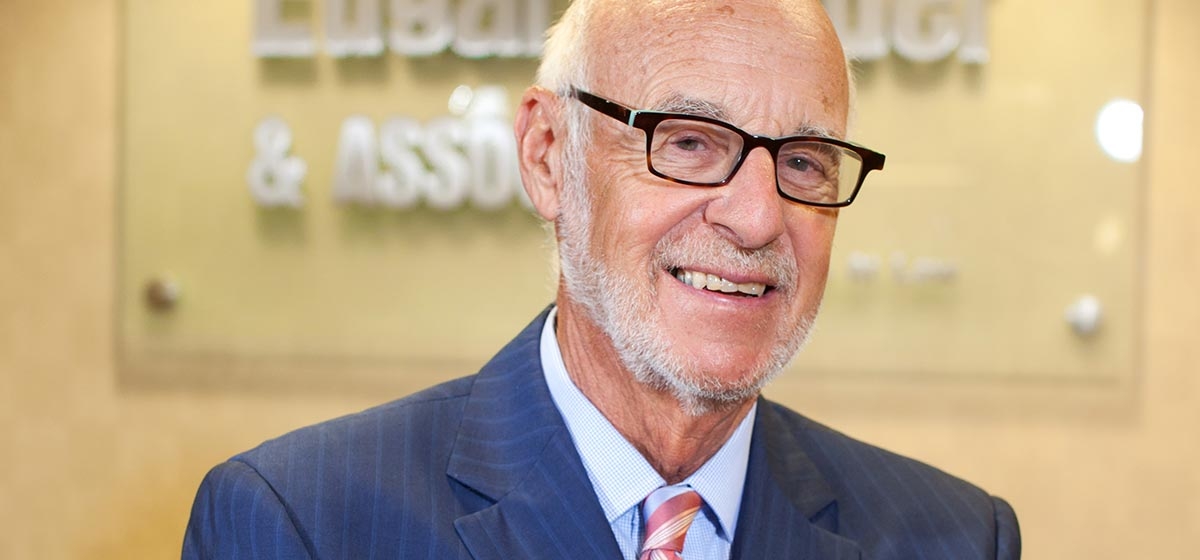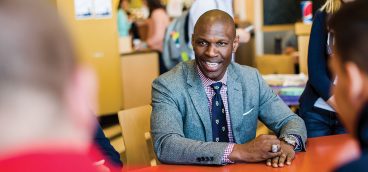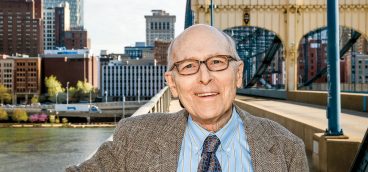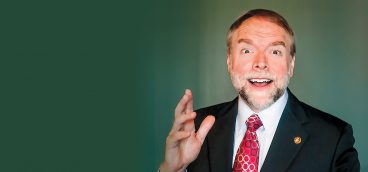
It all started back in 1977 with the U.S. Supreme Court case, Bates v. State Bar of Arizona. In that case, the Court held that lawyer advertising is commercial speech and as such is protected by the First Amendment. That decision totally upset the longstanding belief among lawyers that advertising their services somehow demeaned the profession. In the year or so that followed, slowly, a small number of lawyers began to advertise. And by 1982, I decided to get in the game.
Even after the court’s decision, many lawyers in our region thought that what I was doing was so in-your-face that they went wild. I was a pariah. Some would say things like, “You were a good trial lawyer, Edgar. Why must you prostitute yourself and bring all of this disgrace to us?” But when considering the criticism, I realized that it was all coming from lawyers. To them, I was “ambulance chasing.” But the public, on the other hand, didn’t seem to care. I was selling a product. If people didn’t believe in it, or if they thought it was a fraud, they wouldn’t buy it, and Edgar Snyder would have gone the way of all products that don’t sell. But 30 years later, I’m still here.
I was born in Connellsville, Fayette County, and lived there until I was 6 years old, when we moved to Pittsburgh. My father was a haberdasher, which was just a fancy name for somebody who sold blue jeans to coal miners. My aunt had a women’s store. Back then, many businesses were closed to Jews. But nobody could stop you from opening up a shop and selling things.
Being Jewish has always been important to me and the older I get—I’m now 70—the more important it becomes. My father was born in Bialystok, Russia, which is now considered Poland. His family left after a pogrom against the local Jewish community. As was customary, my uncle, being the oldest of seven children, was sent off to settle elsewhere. (He landed in Montreal). My father, who was just 11 at the time, followed later with another brother who was 13. But most of their extended family stayed in Bialystok with few if any serious problems—until 1938, that is, when most of the town’s Jewish population was exterminated. I went to Poland in 2000 and took a side trip to my father’s hometown just to see what the place was like. It looked probably much as it did in 1900. There were no skyscrapers and no businesses of which to speak, but there were also very few Jews. And Bialystok, before the war, was 65 percent Jewish! Facts such as these have left me culturally tuned-in and very aware. All three of my kids have been to Israel. Two of my three grandchildren go to a Jewish school today. One, who is only in third grade, is already learning Hebrew.
Anyway, my parents got married in Pittsburgh in 1929, three months before the Great Depression. Before long, like many other people at that harrowing time, they had lost everything. So I grew up in Squirrel Hill in a home filled with stories of what it was like to be left with nothing, and where, for some period of time, you had to live on the barter system. I was taught that if you make a dollar, you must save a dime. And my father’s experience as an immigrant with only a fifth-grade education left him committed to seeing that all of his children were educated.
My brother, sister and I all went to public school. I graduated from Taylor Allderdice High in 1959, at which time my brother was also graduating—from medical school, in Philadelphia. My sister, who was also older than me, ended up getting a master’s degree and went to work for Westinghouse. But my brother, the physician, was truly the pride of our family. And I was determined to make my parents proud, too. Unfortunately, when I went to Penn State and got a “C” in chemistry, my hopes for a medical career were dashed. But I remember, at the time, having a conversation with my mother, who was a very funny person with a great a sense of humor. (She grew up in Homestead, by the way, and actually had a college education from Pitt!) She said to me, “Edgar, if you can’t become a doctor, you should become a lawyer because you’ve got the biggest mouth of anybody I’ve ever met.” She was right. I could argue about anything.
At Penn State, I put my big mouth to work as a member of the debate team. I was captain for two years, competed in different parts of the country and, as a result, was able to hone my ability to speak and to think quickly. My strong suit has always been the ability to articulate concepts and ideas, not my intellect. Given my big mouth and ability to articulate, law school did indeed seem right for me. So I went to Pitt Law and was truly lucky to survive, graduating near the bottom of my class. That’s the truth, and I don’t try to hide it. It serves many people well to understand that you don’t have to be a top student to become something in life. It’s what you choose to do and how hard you’re willing to work at it that counts.
Most people know me from my ads on television, which began in 1986. But actually, I started advertising my services in newspapers three years earlier. My wife Sandy and I got married in 1982, and in 1983 the drunk-driving laws in Pennsylvania were changed. Before that, drunk driving was only a summary offense handled in a magistrate’s office. If you didn’t kill or seriously hurt anybody, you paid a fine, and that was it. Now, Sandy had been a biology teacher who had gone back to school and got an M.B.A. Before she married me, she was doing advertising for professionals: dentists, for example, which wasn’t usual at the time. One day, she simply said to me, “Why don’t you put an ad in the newspaper to inform people about the changes in the drunk-driving laws?” I thought, “Why not?” So we placed a small ad in both The Pittsburgh Press and the Pittsburgh Post-Gazette with the headline: “Know Your Rights.” Before long, I was being hired by white-collar people who had been arrested as a result of the new drunk-driving laws. In short order, I had to become an expert on the subject and attended seminars to learn things such as how to defeat breathalyzer machines and how to challenge their constitutionality in court. And lo and behold, we started winning cases. So we decided to place ads in all the local newspapers in a five-county area—and started getting more and more calls. I got so busy that I had to hire another lawyer, Cindy Danel, who incidentally is still my partner today. And about a year later, we had the largest drunk-driving practice in the city of Pittsburgh.
Business was steady and things were looking up, yet I knew I didn’t want to be a drunk-driving lawyer for the rest of my career. I also believed that there was a good market out there for ordinary people who had been hurt in accidents. Up until that time, lawyers got accident cases primarily by word of mouth, or from people called “runners” who worked for them; the proverbial ambulance chasers. In any case, Sandy and I began placing ads for personal injury cases in local newspapers. In no time, we started getting them. My hunch had been confirmed.
I’m Jewish. I talk with my hands, like Italian people do. One day in a meeting, I pointed my finger and said, “And there’s never a fee unless we get money for you.” That statement is the one with which I am most closely associated. But you must understand that we have never offered anything more than would or could be offered by any other lawyer anywhere, including the no-fee promise, but the public didn’t know this! People who had money hired their own lawyers. They still do today. But if you were blue-collar, not particularly educated, and didn’t live in a neighborhood where the guy across the street was a lawyer, what were you supposed to do? There was a whole public out there who effectively were being denied access to lawyers—not because they weren’t allowed to hire them, but because they didn’t think they had enough money to do so. In fact, the main reason the Supreme Court ultimately didn’t strike down lawyer advertising in 1977 was because it provided access to people in need of legal help where access didn’t exist before. As long as your advertising wasn’t false or misleading, you were good to go.
But back in the 1980s, people, especially those of modest means, were loath to pay for toll calls to seek legal advice. So we gave them an 800 number. Many people were also unwilling to pay travel costs to meet with a lawyer, even with a no-fee guarantee. So we bought a van—the poor man’s answer to a company jet—and traveled all over western Pennsylvania, even out to the hinterlands. I had a desk in there. I’d pull up and ask prospective clients to come out to sit and talk business. We were all about giving access to people who needed help. And it really paid off.
Around that same time, Sandy and I started going to seminars focused on marketing for lawyers. Before long, we decided to push our efforts out further by trying television. So we opened up a storefront office in Johnstown, a town to which I had never been in my life, and put an ad for our legal services on TV. Business took off, and Johnstown’s lawyers went out of their minds because I started cutting into their business. Local sentiment, again mostly amongst lawyers, got so bad that when I decided to join the Cambria County Bar Association, which was my right as a practicing lawyer in good standing, they refused me! It was the first time any lawyer had been denied membership to a bar association, not because he had a criminal record, but because he was advertising. I then thought, “What the heck?” And we expanded around the state, opening up several new markets.
Now, some people think that I was the first lawyer to advertise on TV, which would be flattering if it were true, but it isn’t. A lawyer by the name of Joel Hyatt advertised his Hyatt Legal Services long before me. He was a young, good-looking guy (who happened to be married to the daughter of Howard Metzenbaum, a U.S. senator from Ohio at that time). He had a lot of money and opened up offices all over the country. And he could handle wills and other routine matters just fine—but personal injury cases, which were often complex, were another story. You had to know what you were doing because people’s lives were at stake. So when Hyatt got such cases, he would refer them to other lawyers, thus farming out the most lucrative part of his business! We recognized this and decided that we should make a direct play for all local personal injury cases via television. We really were the first to do this en masse. We were even willing to borrow money to make it happen. (Television advertising was and still is expensive.) Sandy said that the goal was to create a brand—the Edgar Snyder brand—which seemed pretty damned funny. But I saw a business opportunity and said to myself, “The longer I can advertise without any real competition, the better I’ll do.” And I did so for about five years. That head start, coupled with Sandy’s business acumen and skill at buying advertising, is what led to our success.
For me, the downside of our firm’s marketing exposure has been that I haven’t been in a courtroom for 20 years. I couldn’t go in and pick a jury. If there were 12 people, 10 might think that I’m a terrific guy, but the other two might say, “He’s an ambulance chaser. I wouldn’t give his client anything.” Not willing to risk hurting my clients, I thought it best to stay on the sidelines and let my partners and associates enter the ring. I since have devoted my days to running the law firm and, in time, learned to be a businessman. We still don’t win all the cases we take on. And when we lose one that has cost us a lot of money up front, I just take a deep breath and keep moving. When you do what we do, you had better pick good cases most of the time. If not, forget about it.
All in all, the financial success we’ve had with Edgar Snyder & Associates has enabled me to pursue my passion, which is helping other people. Philanthropically, Sandy and I have been able to do things for disadvantaged people in Pittsburgh and in other parts of the world, work that makes me as proud—if not more so—than anything I’ve done in the legal area. We set up an emergency fund in Russia for poor Jews in Moscow and in the Ural Mountains, and travel to Russia regularly. That country may be a first-world power, but it is not a first-world place if you don’t have money and you get sick and need social services. Unlike in the U.S., people there have no safety net whatsoever.
I sit on the international board of the American-Jewish Joint Distribution Committee—we call it “The Joint”—which partners with Sandy and I to administer emergency S.O.S. funds to ensure that people in those regions of Russia have enough money for the basics. If someone has a hole in their roof and can’t pay to get it fixed, we fix it. If children need shoes and their parents can’t afford them, we buy them shoes. If a cancer patient doesn’t have enough money for chemotherapy, we make the funds available. Sandy and I also set up a local S.O.S. emergency fund, which was modeled after the program in Russia, for needy Pittsburghers through Jewish Family & Children’s Services. We do all of this because we believe that it is our responsibility to give back. If you’ve been successful in life, you are obligated to offer assistance to those who haven’t had the advantages you’ve had.





